高中英语必修五第三单元知识点整理
- 格式:doc
- 大小:49.50 KB
- 文档页数:14
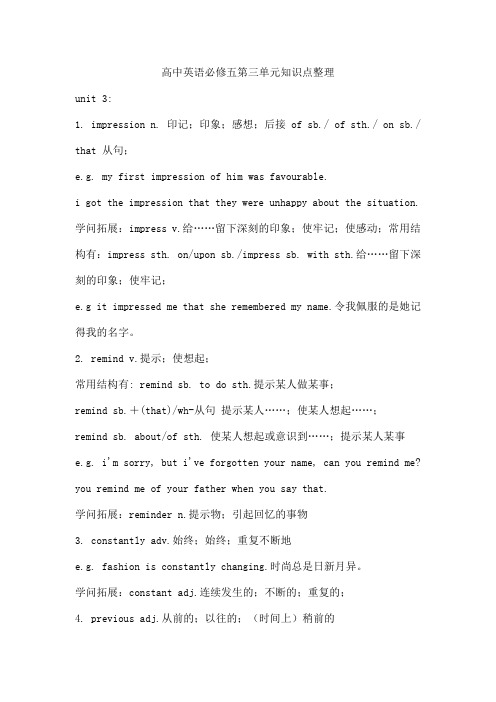
高中英语必修五第三单元知识点整理unit 3:1. impression n. 印记;印象;感想;后接 of sb./ of sth./ on sb./ that 从句;e.g. my first impression of him was favourable.i got the impression that they were unhappy about the situation. 学问拓展:impress v.给……留下深刻的印象;使牢记;使感动;常用结构有:impress sth. on/upon sb./impress sb. with sth.给……留下深刻的印象;使牢记;e.g it impressed me that she remembered my name.令我佩服的是她记得我的名字。
2. remind v.提示;使想起;常用结构有: remind sb. to do sth.提示某人做某事;remind sb.+(that)/wh-从句提示某人……;使某人想起……;remind sb. about/of sth. 使某人想起或意识到……;提示某人某事e.g. i'm sorry, but i've forgotten your name, can you remind me? you remind me of your father when you say that.学问拓展:reminder n.提示物;引起回忆的事物3. constantly adv.始终;始终;重复不断地e.g. fashion is constantly changing.时尚总是日新月异。
学问拓展:constant adj.连续发生的;不断的;重复的;4. previous adj.从前的;以往的;(时间上)稍前的e.g. no previous experience is necessary for this job.i couldn't believe it when i heard the news. i had only seen him the previous day.学问拓展:previously adv. 从前的;早先e.g. the building had previously been used as a hotel.5. bend v.(bent bent)弯曲;使弯曲;弯腰;弯身;e.g. it's hard to bend an iron bar. 把铁棒弄弯很不简单。
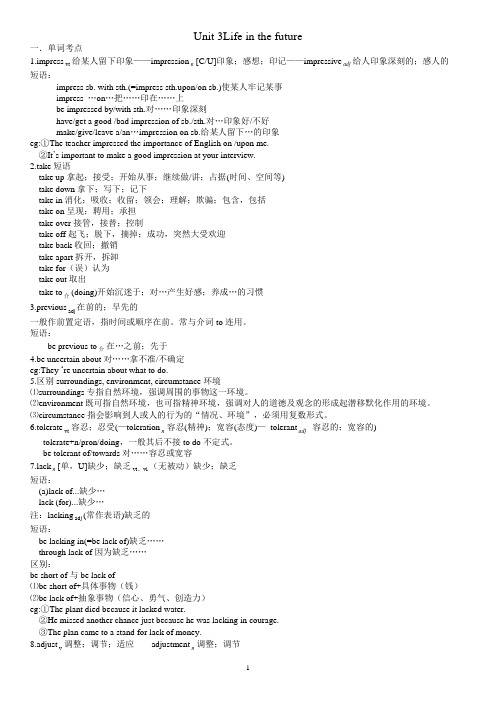
Unit 3Life in the future 一.单词考点1.impressvt 给某人留下印象——impressionn[C/U]印象;感想;印记——impressiveadj给人印象深刻的;感人的短语:impress sb. with sth.(=impress sth.upon/on sb.)使某人牢记某事impress …on…把……印在……上be impressed by/with sth.对……印象深刻have/get a good /bad impression of sb./sth.对…印象好/不好make/give/leave a/an…impression on sb.给某人留下…的印象eg:①The teacher impressed the importance of English on /upon me.②It’s important to make a good impression at your interview.2.take短语take up拿起;接受;开始从事;继续做/讲;占据(时间、空间等)take down拿下;写下;记下take in消化;吸收;收留;领会;理解;欺骗;包含,包括take on呈现;聘用;承担take over接管,接替;控制take off起飞;脱下,摘掉;成功,突然大受欢迎take back收回;撤销take apart拆开,拆卸take for(误)认为take out取出take to介(doing)开始沉迷于;对…产生好感;养成…的习惯3.previousadj在前的;早先的一般作前置定语,指时间或顺序在前。
常与介词to连用。
短语:be previous to介在…之前;先于4.be uncertain about对……拿不准/不确定eg:They ‘re uncertain about what to do.5.区别surroundings, environment, circumstance环境⑴surroundings专指自然环境,强调周围的事物这一环境。

U3(BX5)What changes do you expect to see in your life in one thousand years’ time.一千年之后你料想会发生什么变化expect (sb.) to do sth. 希望(某人)做某事I expect to be back within a week.I didn’t expect him to stay so long.hope to do something 希望做某事Joan’s hoping to study law at Harvard.overcome one‘s shortcomings 克服缺点overcome enemy 压倒, 制服be overcome with/by sth ...不堪(通常指感情,常用被动语态)We were overcome with joy. 我们喜出望外。
She was overcome by fear. 她吓得要命First impressions.第一印象impressions: n. [C] 印象;感想I had a very good impression of him. 我对他的印象很好.What is your first impression of Mao ming ?First impressions are half the battle. [谚]最初的印象最深刻; 先入为主。
impress1) v. 使(某人)印象深刻What does this latest novel impress you ?He impressed me unfavorably. 我对他印象不好注意:使(某人)印象深刻,常用这个句型be impressed by/at/with sth 对…留下深刻印象,惊叹通常用于被动语态,不用于进行时,常用于下列结构:The teachers were most impressed by your performance in the exam.The foreign delegate was greatly impressed by the development of our industry .那位外国代表看到我国的工业发展大为惊叹。
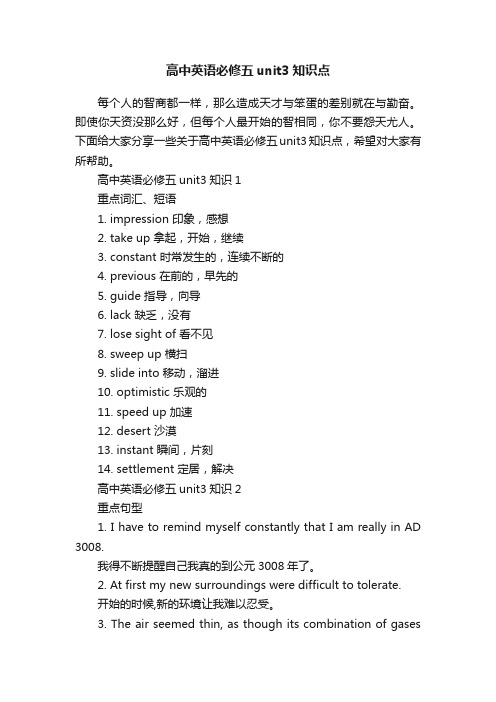
高中英语必修五unit3知识点每个人的智商都一样,那么造成天才与笨蛋的差别就在与勤奋。
即使你天资没那么好,但每个人最开始的智相同,你不要怨天尤人。
下面给大家分享一些关于高中英语必修五unit3知识点,希望对大家有所帮助。
高中英语必修五unit3知识1重点词汇、短语1. impression 印象,感想2. take up 拿起,开始,继续3. constant 时常发生的,连续不断的4. previous 在前的,早先的5. guide 指导,向导6. lack 缺乏,没有7. lose sight of 看不见8. sweep up 横扫9. slide into 移动,溜进10. optimistic 乐观的11. speed up 加速12. desert 沙漠13. instant 瞬间,片刻14. settlement 定居,解决高中英语必修五unit3知识2重点句型1. I have to remind myself constantly that I am really in AD 3008.我得不断提醒自己我真的到公元3008年了。
2. At first my new surroundings were difficult to tolerate.开始的时候,新的环境让我难以忍受。
3. The air seemed thin, as though its combination of gaseshad little oxygen left.空气似乎很稀薄,好像在混合的气体中剩下的氧气很少。
4. Hit by a lack of fresh air, my head ached.由于缺乏新鲜空气,我感到头痛。
5. Soon I was back on my feet again and following him to collect a hovering carriage driven by computer.很快我又重新振作起来,然后跟随他领取了一部由电脑控制的气垫车。
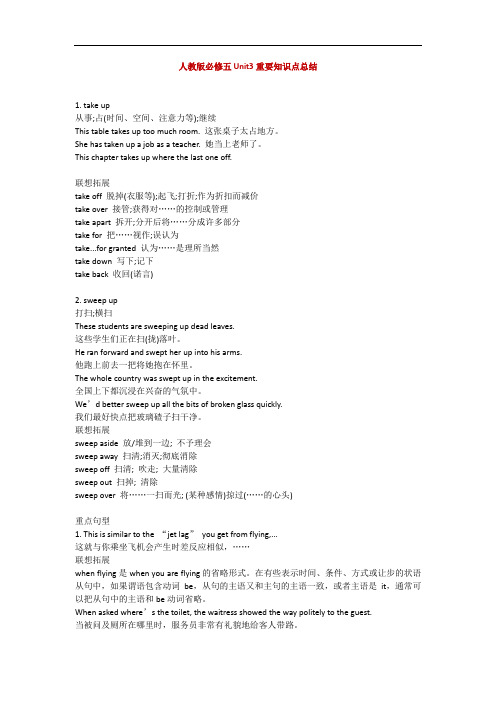
人教版必修五Unit3重要知识点总结1. take up从事;占(时间、空间、注意力等);继续This table takes up too much room. 这张桌子太占地方。
She has taken up a job as a teacher. 她当上老师了。
This chapter takes up where the last one off.联想拓展take off 脱掉(衣服等);起飞;打折;作为折扣而减价take over 接管;获得对……的控制或管理take apart 拆开;分开后将……分成许多部分take for 把……视作;误认为take...for granted 认为……是理所当然take down 写下;记下take back 收回(诺言)2. sweep up打扫;横扫These students are sweeping up dead leaves.这些学生们正在扫(拢)落叶。
He ran forward and swept her up into his arms.他跑上前去一把将她抱在怀里。
The whole country was swept up in the excitement.全国上下都沉浸在兴奋的气氛中。
We’d better sweep up all the bits of broken glass quickly.我们最好快点把玻璃碴子扫干净。
联想拓展sweep aside 放/堆到一边; 不予理会sweep away 扫清;消灭;彻底消除sweep off 扫清; 吹走; 大量清除sweep out 扫掉; 清除sweep over 将……一扫而光; (某种感情)掠过(……的心头)重点句型1. This is similar to the “jet lag”you get from flying,...这就与你乘坐飞机会产生时差反应相似,……联想拓展when flying是when you are flying的省略形式。

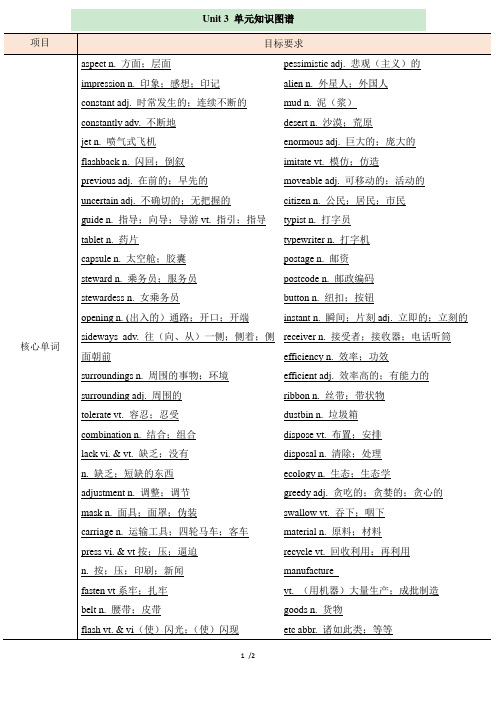
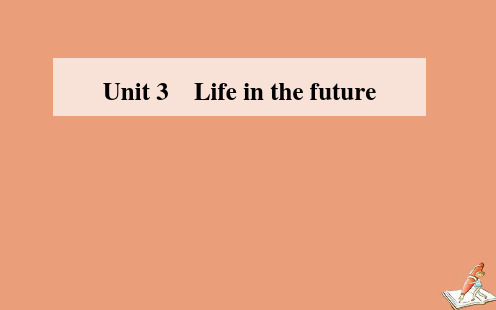

高中英语必修五unit3知识点高中英语必修五Unit3是关于社会问题的探讨,主要涉及到的话题包括环保、健康和媒体等。
本文将从以下几个方面详细介绍该单元的知识点。
一、词汇本单元的词汇涵盖了环境问题、健康、媒体等多个方面。
例如,environmental issues(环境问题)、pollution(污染)、recycle(回收利用)、junk food(垃圾食品)、calorie(卡路里)、exercise(锻炼)、media(媒体)、advertising(广告)等。
此外,还包括一些日常用语和习惯用语,例如,how come(为什么)、no big deal(没什么大不了的)等。
二、语法1. 主动语态和被动语态本单元中涉及到了主动语态和被动语态的用法。
主动语态强调主语的动作或行为,被动语态则强调受动者或对象。
例如,主动语态的句子是“He throws the ball.”(他扔球),被动语态的句子是“The ball is thrown by him.”(球被他扔了)。
2. 现在时和过去时本单元中也涉及到现在时和过去时的用法。
现在时用于描述现在正在发生的事情或者一般性的真理。
例如,“Plants produce oxygen.”(植物会产生氧气)。
过去时则用于描述过去的事件或状态。
例如,The park was crowded with people yesterday morning.(昨天早上公园里挤满了人)。
3. 条件句本单元中还涉及到条件句的用法,包括真实条件句和虚拟条件句。
真实条件句用于描述现实中的情况,形式为“If+现在时+现在时”,例如,If you work hard, you will succeed.(如果你努力工作,你将会成功)。
虚拟条件句则用于描述一种假设情况,形式为“If+过去时+would/could+动词原形”,例如,If I had enough money, I would buy a new car.(如果我有足够的钱,我会买一辆新车)。

高中英语必修五第三单元知识点整理本文整理了高中英语必修五第三单元的知识点,旨在帮助同学们更好地掌握这一单元的内容。
1. 主要词汇本单元的主要词汇包括:•当务之急:matter of immediate importance•情景剧:drama•幻灯片:slide•公益广告:public service ad•视力:eyesight•预防措施:preventive measures•受害者:victim•大事故:major accident•心理:psychology•神经:nerve•盈利的:profitable•缓解压力:relieve stress•运营商:operator•失眠:insomnia2. 重点短语本单元的重点短语包括:•给……捐款:make a donation to•唐装:Han costume•回收:recycle•丢失:be missing•确保:make sure•打扰某人:bother somebody•以免,以防:in case•高效地:effectively•与……分享:share with3. 语法知识本单元的语法知识包括:1. 介词用法介词是连接词与词之间关系的一种词类,本单元重点介绍了以下几种常用的介词用法:•上下文逻辑关系:for, to, by, in, at•表示时间:in, on, at•表示地点:at, in, on, under, over•表示方式:in, on•表示目的:for, to•表示原因:for, because of2. 直接引语和间接引语本单元还介绍了直接引语和间接引语的转换。
在直接引语中,人们使用原话,用引号括起来,而在转述时,要将原话改为间接引语,并根据情况作相应的变化。
•直接引语: He said,。

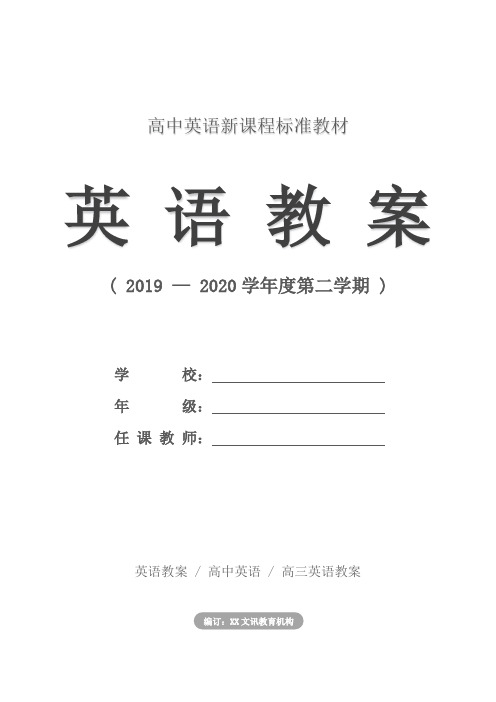
高中英语新课程标准教材英语教案( 2019 — 2020学年度第二学期 )学校:年级:任课教师:英语教案 / 高中英语 / 高三英语教案编订:XX文讯教育机构高中英语必修五第三单元知识点整理教材简介:本教材主要用途为通过学习英语的内容,提高学生的语言技能,增加一项语言能力,有利于国际化的日常交流、生活、工作等,本教学设计资料适用于高中高三英语科目, 学习后学生能得到全面的发展和提高。
本内容是按照教材的内容进行的编写,可以放心修改调整或直接进行教学使用。
unit 3:1. impression n. 印记;印象;感想;后接 of sb./ of sth./ on sb./ that 从句;e.g. my first impression of him was favourable.i got the impression that they were unhappy about the situation.知识拓展:impress v.给……留下深刻的印象;使铭记;使感动;常用结构有:impress sth. on/upon sb./impress sb. with sth.给……留下深刻的印象;使铭记;e.g it impressed me that she remembered my name.令我佩服的是她记得我的名字。
2. remind v.提醒;使想起;常用结构有: remind sb. to do sth.提醒某人做某事;remind sb.+(that)/wh-从句提醒某人……;使某人想起……;remind sb. about/of sth. 使某人想起或意识到……;提醒某人某事e.g. i'm sorry, but i've forgotten your name, can you remind me?you remind me of your father when you say that.知识拓展:reminder n.提醒物;引起回忆的事物3. constantly adv.始终;一直;重复不断地e.g. fashion is constantly changing.时尚总是日新月异。

Unit 3 Life in the future (知识点剖析)(一)单词·巧记·典句·考点1. vehicle[v'i:ikl]n.交通工具;车辆【经典例句】The street is dominated by car vehicles.街道上满是车辆。
【考点聚焦】1)vehicle 特指陆地上的交通工具。
2)vehicle还可以指“(思想、情报的)传达手段、媒介”,如:This radio station has become a vehicle for conservative opinion.这家电台已成为保守派意见的传播管道。
2. private[p'rivit] adj.私人的;私有的【经典例句】This is private parking lot, you cannot park here.这是私人的停车点,你不能在这里停车。
【考点聚焦】1)固定搭配:in private 秘密的;不公开的;私下的反义词:in public 公开的;公众的2)同根词:privacy n.私生活;隐私如:Telling that on TV was invasion of her privacy.在电视上谈论那件事侵犯了她的隐私权。
']n.印象;感想;印记3. impression[im pre【经典例句】His speech made quite an impression on the audience.他的演说给听众留下了相当好的印象。
【考点聚焦】1)固定搭配:leave/make/have a...impression 给某人留下……印象be under the impression that... 觉得;以为his impression of her=her impression on him 她给他留下的印象2)其动词形式impress用法:impress 作“使(某人)印象深刻”时,通常用于被动语态:be impressed by/at/with sth.或be impressed on one’s mind/memory。
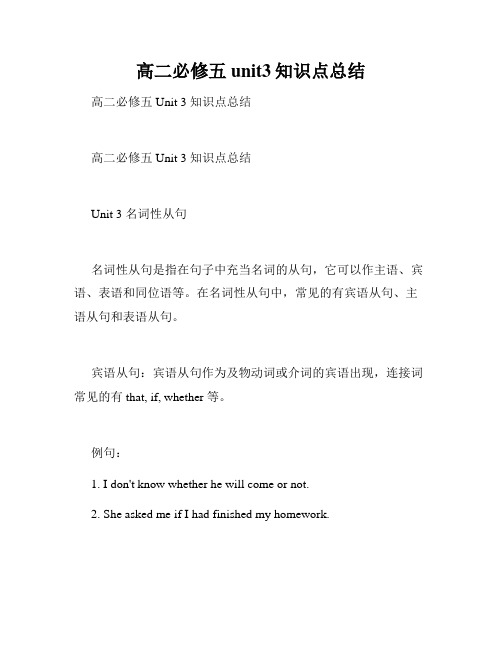
高二必修五unit3知识点总结高二必修五 Unit 3 知识点总结高二必修五 Unit 3 知识点总结Unit 3 名词性从句名词性从句是指在句子中充当名词的从句,它可以作主语、宾语、表语和同位语等。
在名词性从句中,常见的有宾语从句、主语从句和表语从句。
宾语从句:宾语从句作为及物动词或介词的宾语出现,连接词常见的有 that, if, whether 等。
例句:1. I don't know whether he will come or not.2. She asked me if I had finished my homework.主语从句:主语从句作为句子的主语出现,连接词常见的有that, whether, it 等。
例句:1. Whether we can pass the exam is uncertain.2. That he is absent today worries me a lot.表语从句:表语从句用来修饰主语或宾语,并对它进行补充说明,连接词常见的有 that, whether 等。
例句:1. The problem is that I can't understand the math equation.2. My wish is that everyone can live in a peaceful world.同位语从句:同位语从句用来解释或说明某个名词或代词,连接词常见的有 that, whether 等。
例句:1. The news that he won the championship thrilled us all.2. I have no idea whether it will rain tomorrow or not.名词性从句的引导词应根据具体情况来选择,切忌机械地使用某个连接词。
另外,需要注意的是引导词的省略。
在主语从句和表语从句中,当从句的谓语动词是一些常用的动词如 believe, know, think, say, hope 等时,可以直接省略连接词 that。
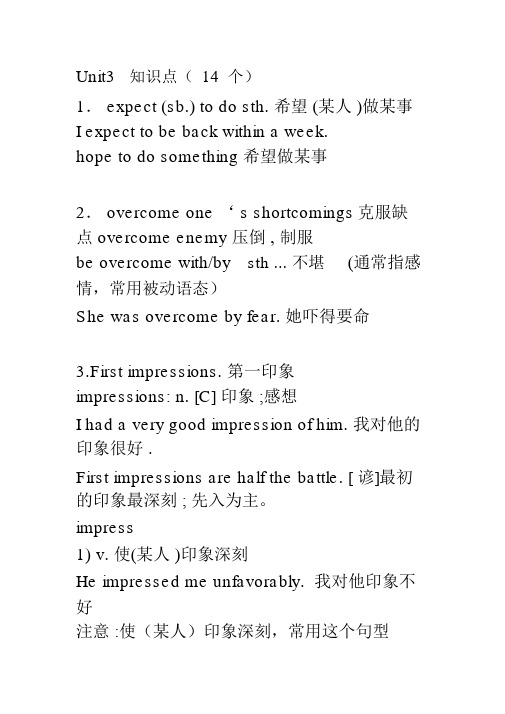
Unit3知识点(14个)1. expect (sb.) to do sth. 希望 (某人 )做某事I expect to be back within a week.hope to do something 希望做某事2. overcome one ‘ s shortcomings克服缺点 overcome enemy 压倒 , 制服be overcome with/by sth ... 不堪(通常指感情,常用被动语态)She was overcome by fear. 她吓得要命3.First impressions. 第一印象impressions: n. [C] 印象 ;感想I had a very good impression of him. 我对他的印象很好 .First impressions are half the battle. [ 谚]最初的印象最深刻 ; 先入为主。
impress1)v. 使(某人 )印象深刻He impressed me unfavorably. 我对他印象不好注意 :使(某人)印象深刻,常用这个句型be impressed by/at/with sth 对⋯留下深刻印象,惊叹通常用于被动语态 ,不用于进行时 ,常用于下列结构 :The teachers were most impressed by your performance in the exam.2)v.使(某人 )铭记impress sth on sb /impress sb with sth3) impressive给人深刻印象的,感人的an impressive scene 感人的场面an impressive ceremony给人深刻印象的典礼4. take upDo you intend to take up his offer of a job?接受This table takes up too much room. 占用 (时间或空间 )When does the new manager take up his job?开始从事由 take 组成的短语: take 后面接office 就职apart 拆开in吸收,留宿it easy 别着急back 收回down 取下 ,记下notes 作笔记away 拿走aim 瞄准out 拿notice of 注意it for granted 想当然的认为hold of 抓住steps to do sth采取措施做某事 sb as.., 把某人当作advantage of⋯利用 a deepbreath深呼吸5 .remind sb.of/about sth.使某人想起某事The film reminded him of his school life.这部影片使他回想起学生时的生活。
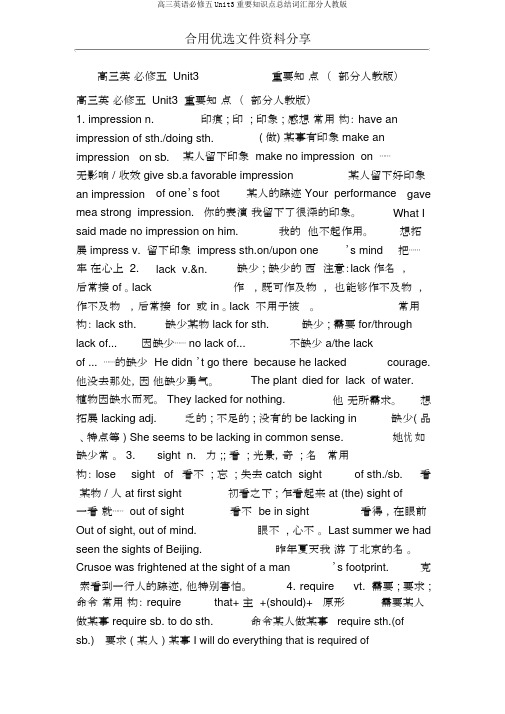
合用优选文件资料分享高三英必修五 Unit3重要知点(部分人教版)高三英必修五 Unit3 重要知点(部分人教版)1. impression n.印痕 ; 印 ; 印象 ; 感想常用构: have an impression of sth./doing sth.( 做) 某事有印象 make an impression on sb.某人留下印象 make no impression on ⋯⋯无影响 / 收效 give sb.a favorable impression某人留下好印象an impression of one’s foot某人的踪迹 Your performance gave mea strong impression. 你的表演我留下了很深的印象。
What I said made no impression on him.我的他不起作用。
想拓展 impress v. 留下印象 impress sth.on/upon one’s mind把⋯⋯牢在心上 ck v.&n.缺少 ; 缺少的西注意:lack 作名,后常接 of 。
lack作,既可作及物,也能够作不及物,作不及物,后常接 for 或 in 。
lack 不用于被。
常用构: lack sth.缺少某物 lack for sth.缺少 ; 需要 for/through lack of...因缺少⋯⋯ no lack of...不缺少 a/the lackof ... ⋯⋯的缺少 He didn ’t go there because he lacked courage.他没去那处,因他缺少勇气。
The plant died for lack of water.植物因缺水而死。
They lacked for nothing.他无所需求。
想拓展 lacking adj.乏的 ; 不足的 ; 没有的 be lacking in缺少( 品、特点等 ) She seems to be lacking in common sense.她忧如缺少常。

必修五英语笔记整理unit3 unit3aspect n. 方面;面貌;方位,方向;形势in many aspects =in many respects在许多方面impression n. 印象,感觉;影响,效果;盖印,印记impressive adj. 可观的;给人印象深刻的,感人的;引人注目的;显赫impress vt. 印;给…以深刻印象;使铭记n. 印象;印记make/leave an important impression on/upon sb/sb’s memory给某人留下重要印象leave a deep/strong/good/bad impression on sb.给某人留下深刻/强烈/好/坏印象impress sb with sth=impress on sb sth 给某人留下印象sb be impressed by/with ...某人对某事印象深刻I was deeply impressed by/with what he said.=What he said impressed me deeply.他说的话给我留下了深刻的印象。
I was deeply impressed by the beauty of West Lake.给我印象最深的是西湖的美景。
The beauty of West Lake makes a deep impression on me.西湖的美景给我留下了很深刻的印象。
My father impressed on me the importance of hard work.=My father impressed me with the importance of hard work.我父亲要我牢记努力工作的重要性。
take up 占用;开始从事;接受(提议)take up one’s arms 拿起武器take up doing=set about doing=get down to doing=set out to do=undertake to do都有“开始做......”的意思I took up learning painting when I graduated from school.当我从学校毕业的时候,我开始学画画。

高中英语必修5第三单元重点、难点Unit Three Life in the Future1、I still cannot believe that I am taking up this prize that I won last year.我还是无法相信我是在接受去年赢得的这个奖励。
关键透析take up 在此句中意为“接受”。
用法归纳(1)占据时间、空间Reading this novel took up most of my spare time.读这部小说占去了我大部分空闲时间。
(2)开始从事My father took up football when he was only ten years old.十岁时,父亲开始踢球。
(3)拿起、举起He took up his book and hurried out.他拿起书匆忙出去了。
(4)欣然接受She took up his offer of a meal.他请她吃饭,她接受了。
2、I have to remind myself constantly that I am really in AD 3008.我得不断提醒自己我真的到公元3008年了。
remind用法归纳:(1)remind sb. about sth. 提醒某人某事Please remind me about the meeting this afternoon. 请提醒我下午的会议。
Can you remind me about the time of the train? 能提醒我火车时间吗?(2)remind sb. of sth. 使某人想起The boy’s story reminded me of my childhood. 那个孩子的经历使我想起了我的童年。
What he said reminded me of my unfinished work. 他的话使我想起了我还没有做完的工作。
高中英语必修五第三单元知识点整理unit 3:1. impression n. 印记;印象;感想;后接 of sb./ of sth./ on sb./ that 从句;e.g. my first impression of him was favourable.i got the impression that they were unhappy about the situation. 知识拓展:impress v.给……留下深刻的印象;使铭记;使感动;常用结构有:impress sth. on/upon sb./impress sb. with sth.给……留下深刻的印象;使铭记;e.g it impressed me that she remembered my name.令我佩服的是她记得我的名字。
2. remind v.提醒;使想起;常用结构有: remind sb. to do sth.提醒某人做某事;remind sb.+(that)/wh-从句提醒某人……;使某人想起……;remind sb. about/of sth. 使某人想起或意识到……;提醒某人某事 e.g. i'm sorry, but i've forgotten your name, can you remind me?you remind me of your father when you say that.知识拓展:reminder n.提醒物;引起回忆的事物 3. constantly adv.始终;一直;重复不断地e.g. fashion is constantly changing.时尚总是日新月异。
知识拓展:constant adj.连续发生的;不断的;重复的; 4. previous adj.先前的;以往的;(时间上)稍前的e.g. no previous experience is necessary for this job.i couldn't believe it when i heard the news.i had only seen him the previous day.知识拓展:previously adv. 先前的;早先e.g. the building had previously been used as a hotel. 5. bend v.(bent bent)弯曲;使弯曲;弯腰;弯身;e.g. it's hard to bend an iron bar. 把铁棒弄弯很不容易。
she bent her head and kissed her daughter. 她低下头吻了她的女儿。
常用搭配有: bend one's mind/efforts to sth. 致力于某事bend sb.to sth. 迫使;说服bend the truth 歪曲事实 6. press v. 压;按;推;挤;坚持;敦促 n. 报章杂志,新闻工作者,新闻界e.g. she pressed a handkerchief to his nose. 她用手绢捂住鼻子。
she pressed down hard on the gas pedal. 她用力踩下油门踏板。
he is still pressing her claim for compensation. 他仍坚持索赔。
the press was/were not allowed to attend the trial. 庭审谢绝新闻采访。
7. switch n. & v. 用作名词表示“开关;转换”。
用作动词表示“转换”。
e.g. she made the switch from full-time to part-timework when her first child was born.press these two keys to switch between documents on screen.i can't work next week, will you switch with me? 8. lack n. & v. 用作名词,表示:“缺乏;短缺”;用作动词,表示:“缺乏;短缺;没有;不足”。
e.g. a lack of food /money/skills 缺乏食物/金钱/技能the trip was cancelled through lack of interest. 因为缺乏兴趣这次旅行被取消了。
he lacks confidence. 他缺乏信心。
知识拓展:lacking adj. 缺乏;没有;匮乏;不足 9. surroundings n.[pl.] 环境;surround v. 围绕;环绕 surrounding adj. 周围的;附近的2020-02-04unit 3:1. impression n. 印记;印象;感想;后接 of sb./ of sth./ on sb./ that 从句;e.g. my first impression of him was favourable.i got the impression that they were unhappy about the situation. 知识拓展:impress v.给……留下深刻的印象;使铭记;使感动;常用结构有:impress sth. on/upon sb./impress sb. with sth.给……留下深刻的印象;使铭记;e.g it impressed me that she remembered my name.令我佩服的是她记得我的名字。
2. remind v.提醒;使想起;常用结构有: remind sb. to do sth.提醒某人做某事;remind sb.+(that)/wh-从句提醒某人……;使某人想起……;remind sb. about/of sth. 使某人想起或意识到……;提醒某人某事 e.g. i'm sorry, but i've forgotten your name, can you remind me?you remind me of your father when you say that.知识拓展:reminder n.提醒物;引起回忆的事物 3. constantly adv.始终;一直;重复不断地e.g. fashion is constantly changing.时尚总是日新月异。
知识拓展:constant adj.连续发生的;不断的;重复的; 4. previous adj.先前的;以往的;(时间上)稍前的e.g. no previous experience is necessary for this job.i couldn't believe it when i heard the news.i had only seen him the previous day.知识拓展:previously adv. 先前的;早先e.g. the building had previously been used as a hotel. 5. bend v.(bent bent)弯曲;使弯曲;弯腰;弯身;e.g. it's hard to bend an iron bar.把铁棒弄弯很不容易。
she bent her head and kissed her daughter. 她低下头吻了她的女儿。
常用搭配有: bend one's mind/efforts to sth. 致力于某事bend sb.to sth. 迫使;说服bend the truth 歪曲事实 6. press v. 压;按;推;挤;坚持;敦促 n. 报章杂志,新闻工作者,新闻界e.g. she pressed a handkerchief to his nose. 她用手绢捂住鼻子。
she pressed down hard on the gas pedal. 她用力踩下油门踏板。
he is still pressing her claim for compensation. 他仍坚持索赔。
the press was/were not allowed to attend the trial. 庭审谢绝新闻采访。
7. switch n. & v. 用作名词表示“开关;转换”。
用作动词表示“转换”。
e.g. she made the switch from full-time to part-time work when her first child was born.press these two keys to switch between documents on screen.i can't work next week, will you switch with me? 8. lack n. & v. 用作名词,表示:“缺乏;短缺”;用作动词,表示:“缺乏;短缺;没有;不足”。
e.g. a lack of food /money/skills 缺乏食物/金钱/技能the trip was cancelled through lack of interest. 因为缺乏兴趣这次旅行被取消了。
he lacks confidence. 他缺乏信心。
知识拓展:lacking adj. 缺乏;没有;匮乏;不足 9. surroundings n.[pl.] 环境;surround v. 围绕;环绕 surrounding adj. 周围的;附近的2020-02-04unit 3:1. impression n. 印记;印象;感想;后接 of sb./ of sth./ on sb./ that 从句;e.g. my first impression of him was favourable.i got the impression that they were unhappy about the situation. 知识拓展:impress v.给……留下深刻的印象;使铭记;使感动;常用结构有:impress sth. on/upon sb./impress sb. with sth.给……留下深刻的印象;使铭记;e.g it impressed me that she remembered my name.令我佩服的是她记得我的名字。